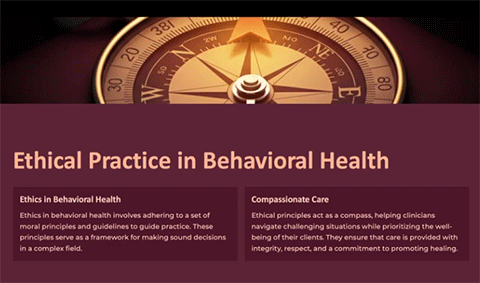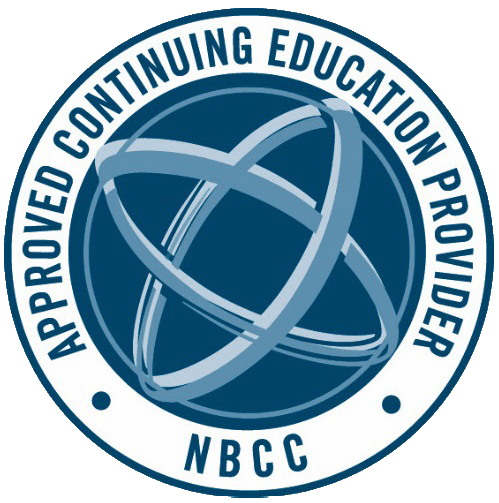Overview
 This comprehensive presentation is designed to enhance your understanding of core ethical principles in behavioral health. This session will cover essential concepts such as autonomy, beneficence, non-maleficence, and justice, providing practical strategies for applying these principles to real-world scenarios. Participants will explore topics including confidentiality, informed consent, and the intersection of legal and ethical standards, with a focus on navigating common ethical dilemmas. Additionally, the presentation will address the influence of cultural diversity on ethical decision-making and emphasize the importance of self-awareness and ongoing professional development. Through interactive discussions and case studies, clinicians will gain valuable insights and tools to uphold ethical standards and deliver elective, compassionate care.
This comprehensive presentation is designed to enhance your understanding of core ethical principles in behavioral health. This session will cover essential concepts such as autonomy, beneficence, non-maleficence, and justice, providing practical strategies for applying these principles to real-world scenarios. Participants will explore topics including confidentiality, informed consent, and the intersection of legal and ethical standards, with a focus on navigating common ethical dilemmas. Additionally, the presentation will address the influence of cultural diversity on ethical decision-making and emphasize the importance of self-awareness and ongoing professional development. Through interactive discussions and case studies, clinicians will gain valuable insights and tools to uphold ethical standards and deliver elective, compassionate care.
Target Audience: This course is designed for licensed mental health professionals—including psychologists, clinical social workers, licensed professional counselors, marriage and family therapists, substance abuse counselors, pastoral counselors, and school counselors—as well as individuals seeking foundational or advanced knowledge in behavioral healthcare.
This course takes approximately 3.5 hours to complete.
Modality
This course comprises a single instructional video with a duration of 3.5 hours. Upon completion of the video, participants are required to undertake a 10-item multiple-choice assessment. To demonstrate proficiency, a minimum score of 80% must be achieved. Three assessment attempts are permitted; however, requests for additional attempts may be submitted following the third attempt but will be subject to a one-week administrative processing period before approval.
Following successful completion of the assessment, participants must complete a mandatory exit survey. Certificate issuance is contingent upon fulfillment of both the assessment and survey requirements. This structured process ensures adherence to academic standards while providing participants with documentation suitable for professional or educational purposes.
Training Details
Learning Objectives
- Participants will be able to understand core ethical principles in behavioral health.
- Participants will learn to apply structured ethical decision-making models to case scenarios to enhance their ability to resolve complex ethical dilemmas.
- Participants will learn about the intersection of legal requirements and ethical standards in behavioral health practice.
- Participants will learn about the impact of cultural diversity on ethical decision-making and learn to incorporate cultural competence into ethical practice to better serve diverse client populations
Register
Take note:
- Please be sure to be logged on to the BHS site.
- Take some time to read over the course guide and understand what is needed to complete this course.
- Click to button below to enter the course. The course will open in a new tab.
- You can always re-visit the course by visiting your My Courses tab on your account page.
Presenters

Brittany Greene
Brittany Greene is a licensed clinical mental health counselor associate (LCMHCA) and licensed clinical addictions specialist associate (LCAS-A) in the State of North Carolina. She also is a National Certified Counselor (NCC). Brittany is the Provider Training Program Specialist for Behavioral Health Springboard within the School of Social Work at the University of North Carolina at Chapel Hill. Brittany has served as a Behavioral Health Ambassador for the SAMHSA-funded HBCU C.A.R.E.S. program, where she worked to expose college students at historically black colleges and universities to careers in the field of behavioral health, as well as issues in behavioral health through interactive presentations and conversations.
She also was a Research Scholar with the Department of Veteran Affairs, Center for Excellence, inaugural cohort participating in research, discussions, and presentations on how to prevent Veteran suicide. Brittany started her career as a mental health clinician in private practice serving individuals with various presenting concerns, including substance use and behavioral disorders. Brittany’s career background prior to her current role has included working in the school system as an Elementary school teacher and as a Disability analyst for the State of North Carolina under the Social Security Administration. Brittany holds a Bachelor’s in Elementary Education from Winston-Salem State University and dual Master’s degrees in Clinical Mental Health Counseling and School Counseling from North Carolina Central University.
Continuing Education
CONTINUING EDUCATION
The UNC School of Social Work has been approved by NBCC as an Approved Continuing Education Provider, ACEP No. 6642. Programs that do not qualify for NBCC credit are clearly identified. The UNC School of Social Work is solely responsible for all aspects of the programs. The successful completion of this online course qualifies for 3.5 contact hours.
POLICIES & ADA ACCESSIBILITY
If you require any of the auxiliary aids or services identified in the Americans with Disabilities Act in order to participate in this program, please call us at (919) 843-6083, or e-mail us at bhs-support@unc.edu. Websites and courses have been developed in compliance of US Section 508 standards where applicable or meeting W3C priority 1 guidelines for web accessibility.
Please contact bhs-support@unc.edu with any questions or concerns regarding this course.
Course Evaluation and Certificate of Completion
Upon finishing each module, participants will be directed to complete and pass a post-quiz (the passing score is 75%). Once completing all modules and quizzes in this course, participants will receive a certificate indicating completion of the course. A .pdf version of the Certificate of Completion can be generated by participants to save or print.



